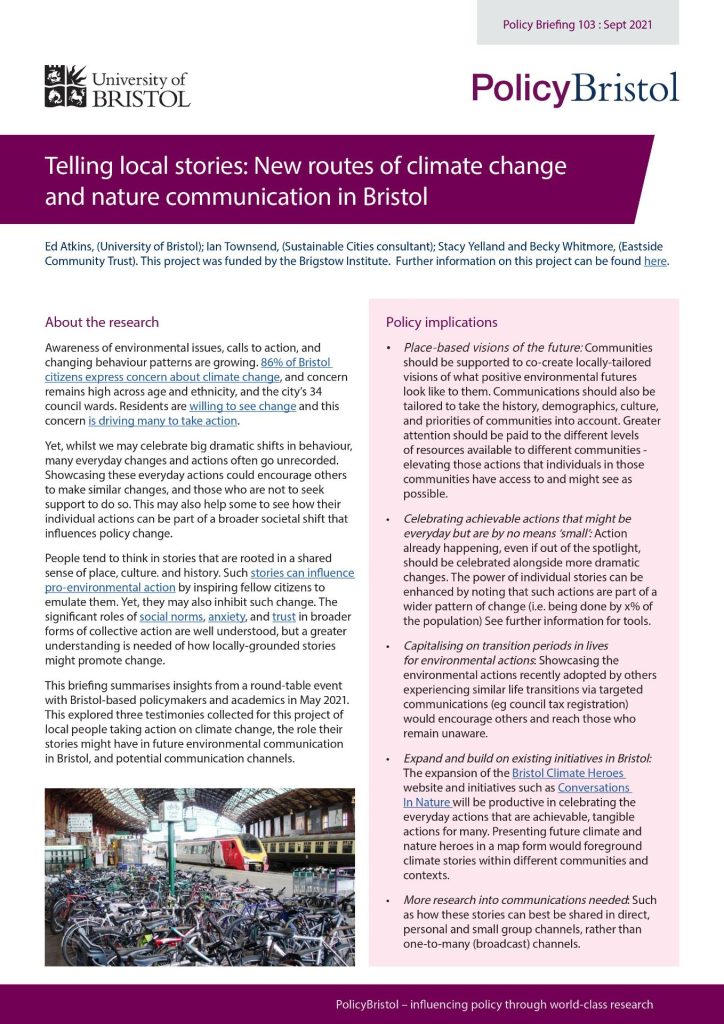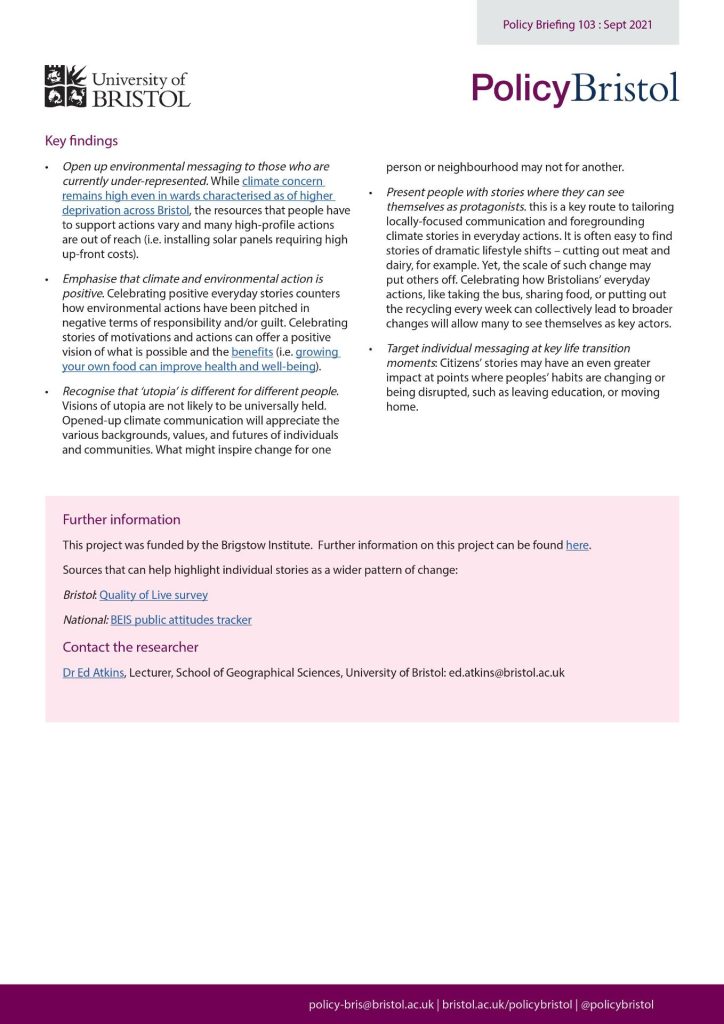Individual actions add up: Finding inspiration in everyday citizen actions to address inequalities in post-pandemic climate and nature emergency responses.
How can the positive environmental actions of the community be properly recognized and learned from to enact future climate policy? How can this help address inequalities in post-pandemic climate and nature emergency responses?

What did the project involve?
This project sought to bring a group of city partners together to consider an identified knowledge gap around the role of citizen-to-citizen engagement in responding to the climate and ecological emergencies. In particular, this Ideas Exchange wished to showcase the ways in which citizens’ everyday actions in the community, which might be overlooked, constitute environmentally-positive behaviour that can provide an inspiration for other citizens to act and so further engagement in these issues. It is necessary to both explore the potential of these everyday stories and analyse the wide range of communication avenues available to enable these to catalyse further action.
This project was intended to further clarify the research question and collaborate with university and city partners to co-produce a potential full research bid that would pilot an approach agreed through this Ideas Exchange. The primary activity was bringing academics together with city stakeholders for a round-table workshop to test interest in the idea and appetite for further work. This was in two parts:
- Discussion with partners – both from the University of Bristol and city’s community – to gauge the extent of a research gap in focus around citizen-to-citizen engagement for climate and nature emergency action that could usefully be filled.
- Consideration of which outputs would work for different city partners, and approaches taken in Bristol and beyond to communicating citizen actions and their likely feasibility and impact.
This drew on a rapid literature and case study review by the project team, covering examples such as: online citizen profiles; short films; public billboards; citizen assemblies; community workshops; community art installations; local print media, community magazines, e-newsletters, free-sheets; social media; community/local radio; podcasts; and ‘people libraries’, where individuals and their experiences are ‘books’ to be ‘borrowed’ by others, which does not seem to have been used in an environmental context.
Who are the team and what do they bring?
- Ed Atkins (Geographical Sciences, University of Bristol) is a researcher whose research broadly explores the topic of ‘just transition’, or how sustainability and/or decarbonisation policies can be made fairer and more inclusive.
- Ian Townsend former Bristol Green Capital Partnership CEO and sustainable cities consultant. He led city-level collaboration towards a shared vision of ‘a sustainable city with a high quality of life for all’, with a focus on the themes of energy, food, nature, resources and transport.
- Stacy Yelland (CEO, Eastside Community Trust) Eastside Community Trust provides people of all ages with places and ways to connect. They are passionate about the community and putting local people in control so together they can build healthy and happy neighbourhoods. Through various communications roles and then as Director of Up Our Street, Stacy has developed strong relationships in the community and a deep understanding of the local area. She believes in the power of community and the central role of public spaces, play and connections between neighbours to make positive change.
- Alix Dietzel (Global Ethics, University of Bristol) is a climate justice and climate policy expert. Focusing both on the global and local scale, she is interested in how just the response to climate change is and how we can ensure a just transition.
- Erika Hanna (Modern History, University of Bristol) is a social historian with research interests in place, visuality and the built environment in Ireland and Britain.
- Rich Pancost (Earth Sciences, University of Bristol) is an organic geochemist, biogeochemist and palaeoclimatologist. Their expertise is in organic geochemistry. His practice uses the organic matter in soils, sediments, rocks and water to investigate a vast range of modern and ancient processes with a particular interest in past climate.
- Markin Parker (Management, University of Bristol) is the Bristol Inclusive Economy Initiative lead whose research and writing widens the scope of business and management studies, whether in terms of particular sorts of organisations (the worker co-op, circus, zoo etc), or ways of representing organising (in art, cartoons, films etc).
- Dale Southerton (Management, University of Bristol) the core focus of Dale’s research is the study of consumption, its role in organizing everyday lives and its significance in processes of societal change.
- Alex Ivory (Bristol City Council Climate Change Team) originally trained as a biological scientist covering evolution, epidemiology and virology, she entered Environment Agency and held numerous roles gaining experience in EU policy, funding, stakeholder relations, communications and change management.
- Amy Harrison (Climate Action Fund) is a highly experienced participation and engagement specialist with a diverse track record of working across the arts & culture, place-making, sustainability, STEM, heritage and community engagement sectors.
- Charlee Bennett (CEO, Your Park Bristol and Bath Parks Foundation) is an activist and charity worker whose charity complements Bristol and Bath’s Clean Air Zones with nature-based climate solutions which increase carbon absorption and offsets emissions. The charity also works with local communities to increase health and wellbeing through access to parks.
What were the results?
Through the project’s exploration of potential routes of climate change communication in Bristol resulted in several outcomes. This involved a literature review, a review of potential channels of communication, the collection of preliminary case studies, and the hosting of a roundtable with policy and academic partners to discuss future routes of communication.
The central policy recommendations included:
- Communities should be supported to co-create locally-tailored visions of what positive environmental futures look like to them.
- Celebrate all levels of positive climate and environmental action.
Below is the policy briefing outlining the research


A full summary of the policy outcomes can be found here: Telling local stories: New routes of climate change and nature communication in Bristol

